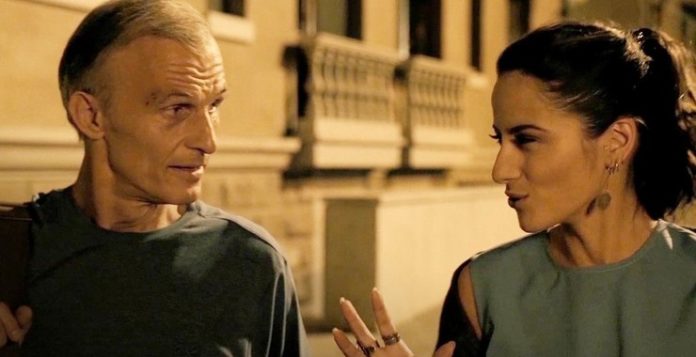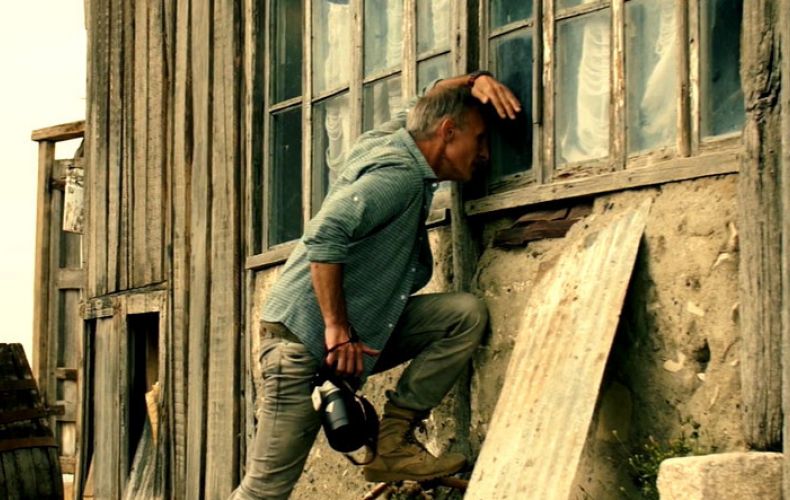by Harry Kezelian
DETROIT — Jivan Avetisyan is a filmmaker from Artsakh. His latest film, “Gate to Heaven,” is on a worldwide tour, being shown in various countries, including in the US, where it was distributed through AMC Theatres.
Avetisyan is following the film’s distribution wherever it goes, making appearances and raising awareness about the movie. But he’s even more interested in raising awareness about the struggle of the people of Artsakh. In fact, that is why he made the film in the first place.
Read also
Although the film is receiving its premiere in various parts of the world, it isn’t exactly new. It was first released on October 17, 2019. With the pandemic and its subsequent lock down five months later, Avetisyan did not have a chance to promote it around the world as he would have liked.
The genesis of “Gate to Heaven” came after the 4-day war of 2016.
Avetisyan said he wanted to make a film that would show the situation in Talish. “I knew stories connected to the war,” he says. “The stories about the opera singer and photojournalist are true, but are brought to the situation that took place in Talish.”
The film tells the story of a German photojournalist who had been in Nagorno-Karabakh during the war in the early 1990s, and who traveled back to Artsakh in 2016 when conflict broke out again. He meets a young singer who is going to perform in an opera. The hidden connection which is revealed between the two main characters forms the rest of the movie’s plot.
The film is more artistic than a Hollywood blockbuster, but it is not an avant-garde style “art film.” Avetisyan has brought a picture of real people and real life to the screen without over-dramatization. Because the film is intended for a worldwide audience, much of the dialogue is spoken in English, with portions in Armenian and German. Avetisyan believed that in this way he could get the message of Artsakh’s struggle across to a wider audience.
Throughout the film, the “Gate to Heaven” (Drakhti Darbast) serves as an actual geographical location, a vista of great beauty looking across a cliff, open to the sky; as well as a metaphor. “Every man has their own drakhti dur (Door to Heaven),” Avetisyan commented in a recent interview. “Every character [in the film] says his sins to confess, and pass through.”
He continues that being born in Artsakh, he views the land with religious fervor. “We are continuing to fight for it; Artsakh is like our Jerusalem, it’s the place which is religious.”
One of the outstanding features of the film is the exquisite cinematography of the scenery and landscapes in and around Shushi. Unfortunately, most of the areas depicted in the film are currently in the hands of the Azerbaijan, including the “Gate to Heaven.” The location serves as a focal point of the film, the opera singer character’s favorite place to go to during her childhood. It seems also a metaphor for the possibilities that Armenia and the Armenian people have to strive for greater heights.
Continuing with the theme of the “Gate to Heaven,” Avetisyan explains that the critical points of the film take place through the development of the main characters’ stories. “There are several critical points, because there are different characters with different fates and different stories. The first one is when the man confesses his sins and comes close to the Gate to Heaven.’ The second one is that the girl is trying to find her father, find her roots and feel completed. The third one is that silence is the same as crime.”
Echoing a common sentiment, Avetisyan explains that the film is intended to be a wake-up call to the world in regard to the situation of the Armenian people in Artsakh and Armenia. “The world was witness to what is happening,” said Avetisyan, “but there are silent.”
At the same time, the film intends to show the struggle of the suffering Armenian people against all odds, while depicting Europeans as relatively well-intended, but focused on their own interests and ultimately ignoring Armenia.
The realization that the main German character has in the end of the film is evidently the same realization that Avetisyan wants Western powers to come to; that they are tied by history to Armenia and there is a moral obligation to come to the country’s aid.
This year, the film was re-released and Avetisyan has been touring the world, including the United States, to promote it. It was shown by AMC Theaters in the US in California, Las Vegas, Michigan, and Boston, and then in three Canadian cities as well.
Avetisyan is currently raising funds for his next film project, “Revival,” which will be in Armenian.
The film is produced by Masis Baghdasaryan, Kestutis Drazdauskas and Adrineh Mirzayan (executive producer). It is a joint production of Armenia, Lithuania, Germany, France, Bulgaria, the Czech Republic, Italy and the US. It stars Richard Sammel, Tatiana Spivakova and Sos Janigekyan. Artavazd Yeghiazaryan (Armenia) and Mko Malkhasyan (US) wrote the script.



























































